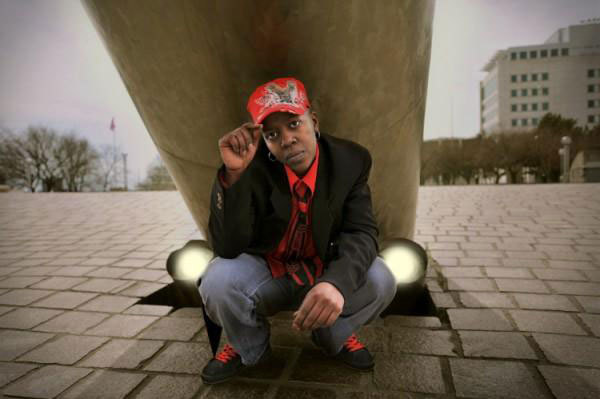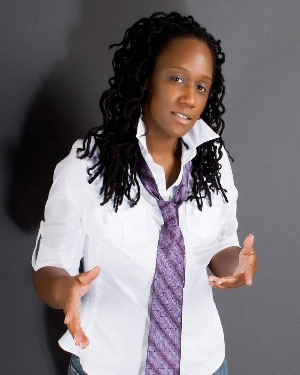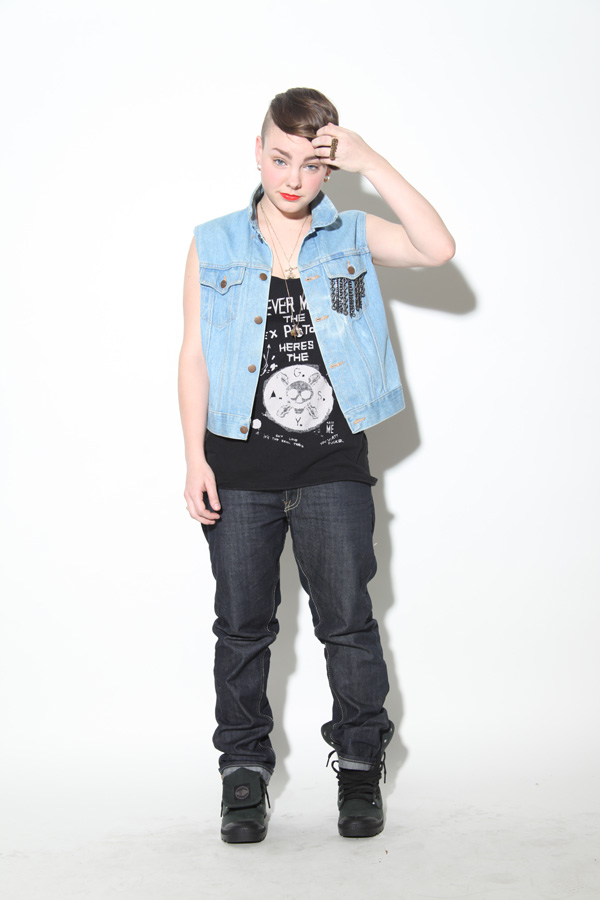Ever since Hip Hop newbie Nicki Minaj rose to stardom, the lack of diversity and representation of female emcees has been a hot topic of discussion, with the media exploring subjects from misogyny to video vixens to the overt sexuality of female rappers. BET even recently made its first original music documentary on the subject, My Mic Sounds Nice: A Truth About Women and Hip Hop.
While several articles have been written about Nicki Minaj and her alleged bisexuality, no one has been talking about the high percentage of same-gender-loving female emcees or how that may play a part in the lack of girl rhyme slayers being given their time in the limelight.
Minaj, the animated “bisexual on wax” is known for rapping about being attracted to women. Most people would assume as much because of lines like “If I’m in yo city I’m signing them tig-o-bitties / I’m plotting on how I can take Cassie away from Diddy” and “I only stop for pedestrians or a real real bad lesbian.” In recent interviews with Black Men and Vibe, the Queens, NY native shot down such assumptions by saying “I don’t date women and I don’t have sex with women.”
It seems the Barbie-representing emcee isn’t comfortable or brave enough to acknowledge her sexuality outside of her music.
It’s usually a journey for us queers to become comfortable with who we are and make the choice to live out loud. In light of the recent suicides committed by LGBT youth and the current political climate that affects homosexual Americans, the community needs plenty of people to stand proud — not simply count themselves among us when it’s convenient. It takes courage for anyone to “come out” or be openly gay, especially for Hip Hop artists, because the culture is extremely homophobic and misogynistic.
In the mainstream media, active female emcees are scarce and the number of openly gay female emcees is pretty much zero. Despite this, however, there are a handful of female rappers who have no problem being proud lady-lovers on and off the mic: Detroit native Mz Jonz, for example, has been out since day one.

She has never had a problem being candid about who she is:
“When I was signed to Black Label in 2001 that was actually one of the first things that I told them before we started working together. It was all good until it was time to release the album and then it became an issue as far as how to market and promote.”
 It’s not necessarily as easy for everyone to be open and comfortable right away: “When I initially started putting out music I wasn’t out as a lesbian. I wasn’t even out as a person yet. My family didn’t know. Only some of my friends knew so I didn’t feel comfortable being out in my music if I wasn’t out as a person,” says Lady Lust, an emcee who is currently infiltrating the Las Vegas music scene. Even though Lust wasn’t initially out in her music she now believes that it’s very important. “Since I’ve been out in my music I get the sense from the responses from people that they feel like someone is speaking for them. It makes them feel empowered and more confident to come out. I didn’t realize how important it was until I did it and started getting the feedback,” she explains.
It’s not necessarily as easy for everyone to be open and comfortable right away: “When I initially started putting out music I wasn’t out as a lesbian. I wasn’t even out as a person yet. My family didn’t know. Only some of my friends knew so I didn’t feel comfortable being out in my music if I wasn’t out as a person,” says Lady Lust, an emcee who is currently infiltrating the Las Vegas music scene. Even though Lust wasn’t initially out in her music she now believes that it’s very important. “Since I’ve been out in my music I get the sense from the responses from people that they feel like someone is speaking for them. It makes them feel empowered and more confident to come out. I didn’t realize how important it was until I did it and started getting the feedback,” she explains.
Hip Hop artists are usually praised for being real and not “faking the funk.” Mz Jonz absolutely refuses to live a lie, on or off wax: “If I wasn’t out in my music I’d be lying. I wouldn’t be able to write a song based on a lie. I know that eventually I’m going to perform a song and someone that has known me for a long time is going to see me. There’s no use in even lying about it. Plus, I’m comfortable with myself so it doesn’t even matter,” she says.
Eyeris, who is also from Michigan but currently resides in New York City, says that she’s learning to be more open because she understands how powerful music is.

“Music is self expression of what I go through; my life, my world. In my everyday life I have to deal with issues such as sexuality, love, and judgment. I’m learning to be more open and express myself about these things in my music. Also, music is a powerful force. People listen to what you have to say if they like your sound and message. I want to open up others to awareness and acceptance.”
Despite hip hop’s discriminatory flaws, these women remain unapologetically devoted to their art form: “I’m going to love music and Hip Hop regardless. There are some rappers who are very misogynistic that I listen to but I don’t let their music dictate my everyday life. It’s just good music. It may have some homophobic terms and slurs but I block it out. It doesn’t really matter to me. It’s music, it’s the artists expressing themselves. Maybe they are homophobic or maybe it just sounded good at the time. They’re doing them and I’m going to do me,” shares Mz Jonz. Lady Lust echoes the sentiment: “I love Hip Hop and I love who I am. It is what it is.”
The Hip Hop community may not be proud of and willing to accept its homosexual rappers, but here at Autostraddle we salute everyone who isn’t afraid to live out loud, especially our female rhyme slayers who have to go to war to be heard.
If you would like to learn more about artists who are out and proud on and off of the microphone, check out the following:
Mz Jonz
Lady Lust
Eyeris
Kin4life
Lady Sovereign
Invincible
Fiona Simone
Siya
Jimmii Montana
Mack Mistress
Evon
Khaos Da Rapper
Yung Snazz
Emerald Morrell
DS Sense
Feloni
Lady Mobsta
Poca The Papergirl
Young Kaii
+








Comments
my brother is really into hip hop. he casually uses words like “fag” and it really influences his views on some things. i will say that last week, he told me watched a documentary on the misogyny and homophobia in hip hop and said it was a “fresh perspective”. i’m hoping this is progress.
Keep calling him on it. Is he in high school? My brother was like this, only he always called everything “queer” – just like his friends. But he stopped mid-way through his first year of college, if not before. I’m not sure if it was
– him figuring out I was queer (before I was even out to myself really)
– my constant reminders that gay-hating is douchey as all hell
– that he just grew up a little, and part of growing up is understanding the world better – and seeing things from others’ points of view (something that adolescents typically don’t excel at.)
I think a lot of young guys, when they’re in predominately masculine environments (my bro was an athlete), have these heterosexist memes they refer to because they don’t know what it is to be a man, and they’re trying to figure it out. And they’re trying to prove to each other and to hetero women that they’re not-gay. Because these boys are naïve and sheltered, they think being gay and being a man are somehow separate. They also think that these memes are inoffensive somehow, at least until someone tells them otherwise.
I can forgive this sort of thing, to an extent, in young boys. I can’t forgive it in anyone old enough to know better. I straight up recoiled in a conversation and ended it abruptly and went to talk to someone else when this girl I’d just met socially described something as “being sooo gay, it was sooo lame!” F-ck off, idiot. You’re 21 and in a good college, and you can’t do better than that? I don’t even want to know you. Bye.
It’s just a matter of avoiding performers that rap about “homo niggas getting AIDS in the ass,” “faggot bullshit” and being “no homo.”* Other rappers can also provide a “fresh perspective.” I suggest printing this page out and taping it to his forehead. Okay don’t do that, just suggest he watch the documentary Pick Up the Mic next.
*those are Lil Wayne lyrics. Just an example.
its quite easy to talk to him as opposed to other members in the family, since we have similar views on some things and he’s older but has always been kinda of ignorant, but thats changed lately, especially since he’s started college. when i hear him say anything offensive regarding women or the gays i call him out on it. theres this one band that he does listen to that has one line in this song. “something something…unused like fallopian tubes on a dyke” which i heard once and flipped out. since then he avoids playing that artist around me.
oh and brianna i haven’t heard anything particularly offensive except for eminiem but i don’t want to go there. he avoids lil wayne, because according to him, his rhymes suck, something i certainly agree with
Oh yeah that was just an example. We could be here all day quoting anti-gay lyrics.
If your brother’s really cool he’ll start playing songs with lyrics like this:
He has girl friends but doesn’t want a girlfriend
He retreats inside himself where he lives life itself in secret
Daddy says people go to hell for being
What he is and he certainly believes him
‘Cause their ain’t no flame that can blaze enough
To trump being hated for the way you love
And cry yourself to sleep and hate waking up
It’s a cold world y’all shame on us
Tightrope – Brother Ali
damn i’ll listen to songs like this. thanks brianna
As far as I know, most (if not all) members of Rhymesayers Entertainment (definitely all in Doomtree) out of Minneapolis/St. Paul are vocally against homophobia in hip hop. I’ve really gotten into DTR and going to see them in a week! I know Mike Mictlan spoke at some big Homophibia in Hip Hop thing last spring in the cities.
“I don’t use [n—-r] in the things that I write, and I don’t say [f—-t] ’cause I don’t think it’s right”
-Stefan “P.O.S.” Alexander
Doomtree.net
Rhymesayers.com
I brought that up because Brother Ali is in Rhymesayers with P.O.S.
Yeah! Hip Hop Against Homophobia! It was awesome:
http://www.tcdailyplanet.net/article/2009/06/11/hip-hop-against-homophobia-fight-rages.html
“no one has been talking about the high percentage of same-gender-loving female emcees or how that may play a part in the lack of girl rhyme slayers being given their time in the limelight”
this is a great point…given the circumstance of men loving to hear/see female-on-female “issues”, it’s surprising that lesbians aren’t more accepted by the perverted male society and given more light than shade.
Yo Majesty should be at the top of this list! Not only are they out they also perform topless occasionally.
And Jwl B was in jail. That’s gives her both hip hop AND lesbian cred.
Yes, this was my first thought after reading too. Do you know what they’re up to these days? I haven’t heard anything about them since Shunda K left.
THAT gives her both hip hop AND lesbian cred.
Typo fail is the worst kind of fail.
Khaos Da Rapper is DOPE. Known her for 3-4 yrs and she’s amazing on the mic. Check her out. . .and Siya, too. Dope emcees who don’t give a fuck.
Glad I wasn’t the only one who noticed Yo! Majesty was missing.
Nice to see Jonezy on here! I’ve noticed that the people I follow on Twitter, and the people who post on here don’t seem to interlap, so it’s nice to see a familiar face.
What about Jane Bang!?
i didn’t see any mention of melange lavonne on here ! she hasn’t put out much lately (atleast on youtube) but y’all should definately look her up !
yes yes yes melange. She’s amazing, and actually one of my lyrical influences.
god-des & she.
I would also like to shout out to Heidi Barton Stink, based out of Minneapolis:
http://www.heidistink.com/
Heidi Barton Stink is a Trans-Radical M.C. based out of Minneapolis MN. She writes and performs HipHop with an emphasis on social justice and trans and queer rights. A talented performer and wordsmith, she is a rising star in the world of independent rap.
Not all artists necessarily have to be out, but Hip Hop’s origins have always emphasized the importance of “voice” over any other music genre. If rappers’ voices are limited based on their sexuality then it’s only completely detrimental to Hip Hop’s entire function. People respect Eminem’s right to express himself through beating bitches, so why not the queer community? I hope all of these artists achieve mainstream fame, but until then the spotlight is all on Nicki. Hopefully she will address these issues more, rather than deny allegations.
Unless Missy decides to come out, and change “Hot Boyz” to “Hot Girlz”. A girl can dream…
And don’t forget Scream Club! Listen to And You Belong. It will be your new lezzie anthem and it will be stuck in your head for months…or in my case, over a year now. their newer stuff is rad too, and Cindy Wonderful of Scream Club was featured on Shunda K’s new single “Here I Am to Save the World”. Good shit.
http://www.myspace.com/screamclub
No one mentioned Melange Lavonne, my all time fav. female rapper who is out in the community and has made a big impact! I love her!
Angel Haze!
http://thelastlines.tumblr.com
Okay, you guys missed a couple of awesome ones.
As has been mentioned:
Melange Lavonne (oh jeez, The Game gives me shivers EVERY TIME)
Yo Majesty
god-des and she
Scream Club
and also worth mentioning is (i think) Detroit-based MC Flow (seriously, check out her EP “Incredible”. It’s, well, incredible)
http://www.youtube.com/watch?v=tuwjBL7dLdM
Don’t forget the Lost Bois! They’re based out of DC and do queer hip-hop/pop. I went to school with one of them; they’re great.
i know this is mad late… but i noticed Jwahari is Royce Hall isn’t listed. she’s dope.